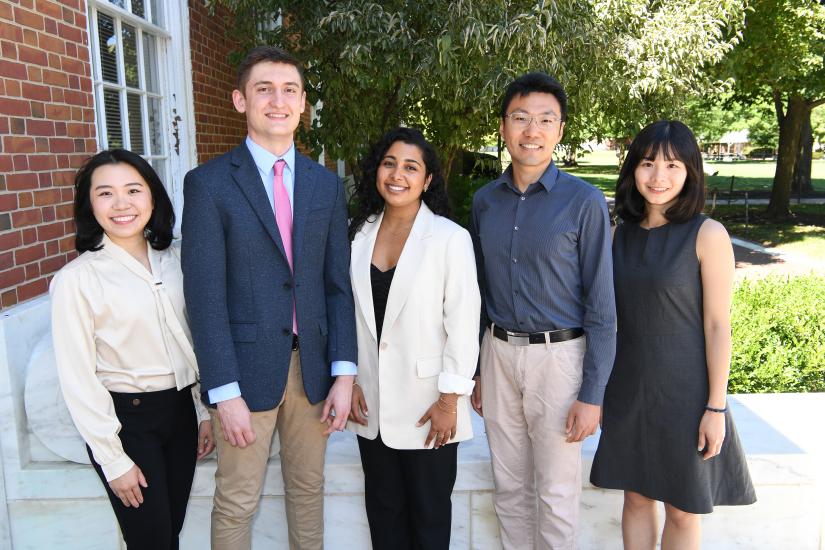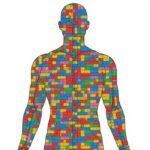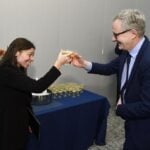Five From Hopkins Named Siebel Scholars

Photo: The 2024 class of Siebel Scholars from Johns Hopkins University are (from left) Inez Lam, Paul Sargunas, Sarah Neshat, Sixuan Li, and Fan-En Chen.
Five Johns Hopkins doctoral students have been named 2024 Siebel Scholars, an honor that recognizes students in bioengineering fields for exemplary achievement in academia, research, and leadership.
Since its founding in 2000, the Siebel Scholarship has been awarded to 75 Johns Hopkins graduate students. Each year, around 100 scholars are selected from leading graduate schools to join a community of nearly 2,000 researchers, scholars, and entrepreneurs. Recipients receive a $35,000 award to support their final year of studies. Additionally, they are invited to attend annual conferences to discuss global issues alongside heads of state, scientists, and other experts seeking solutions to the world’s most complex and pressing problems.
The 2024 Siebel Scholars with ties to the Johns Hopkins Institute for NanoBioTechnology are:
Fan-En Chen
Fan-En Chen works in the lab of Jeff (Tza-Huei) Wang, a professor in mechanical engineering and biomedical engineering at the Whiting School of Engineering, focusing on the development of decentralized antimicrobial susceptibility testing through the use of point-of-care devices. By combining her expertise in analytical assay design with her engineering knowledge, Chen is developing a highly multiplexed detection for sexually transmitted diseases. Her work has resulted in six first-author and 13 co-authored publications, along with three patents and seven conference presentations.
Outside the lab, she served as president of the Taiwanese Student Association at Johns Hopkins and currently is co-president of the Graduate Consulting Club. Addressing a career information gap for Taiwanese life scientists, Fan-En co-founded a podcast, leading a team of 11 scientists. The podcast has over 60 episodes with more than 100,000 downloads.
Inez Lam
As a biomedical engineering PhD candidate and an inaugural JHU-AstraZeneca Scholar, Inez Lam works closely with scientists in industry and academia for her thesis research in the lab of Feilim Mac Gabhann, an associate professor in the Department of Biomedical Engineering, where she builds computational systems pharmacology models to understand antibody-drug conjugates in AstraZeneca’s portfolio and improve cancer treatments. Lam served as co-president and faculty-student liaison of the BME PhD Council, spearheading professional development events and community-building initiatives. She co-founded and was co-president of Women of Whiting, a university-wide support network for over 200 graduate women in engineering, and chaired the planning committee for the initial years of the Women in STEM Symposium, attended by hundreds. Recognized by Forbes “30 Under 30” as a top entrepreneur, Lam co-founded and is CTO of ClearMask. She is also the main inventor and engineer of ClearMask’s transparent surgical mask, leading the product from conception to creation to 20 million sold and $45 million in revenue.
Sixuan Li
Sixuan Li is currently a PhD candidate in the Department of Mechanical Engineering advised by Jeff (Tza-Huei) Wang. His research focuses on developing and applying innovative methods in the single-molecule analysis, particularly focusing on nucleic acids, proteins, and nanoparticles. His multidisciplinary approach draws from biophysics, chemistry, optics, and engineering to push the boundaries of scientific knowledge. His work has been published in journals including Nature Communications, Analytical Chemistry, Lab on a Chip, and Small Methods, and he holds a patent on the characterization of nanoparticles.
Looking ahead, Li envisions the establishment of CICS Analytics, a startup company that leverages single molecule fluorescence spectroscopy and cutting-edge toolkits to provide comprehensive analyses of therapeutic nanoparticles. He is committed to developing more effective and safer nanomedicines and advancing the field of cell and gene therapy.
Sarah Neshat
Sarah Neshat, a first-generation college graduate, completed her studies at Northeastern University with three six-month co-ops in pharma, academia, and biotech. Neshat is a recipient of graduate scholarships from the NSF, GEM Consortium, ARCS-MWC Endowment, and P.E.O. Her PhD thesis focuses on non-viral gene delivery immunotherapies for oncology and autoimmune diseases, thus far resulting in 11 papers, three patents, and over eight conference presentations; her co-advisers are Jordan Green, professor and vice chair for Research and Translation in the Department of Biomedical Engineering; and Joshua Doloff, assistant professor of biomedical engineering, materials science and engineering, and oncology. Passionate about STEM education access, Neshat co-founded the JHU BME Application Assistance Program, aiding underrepresented students in pursuing BME PhD programs. She instructed the inaugural Biomedical Engineering Innovation course at Baltimore’s all-girls Roland Park Country School and mentored five students in the lab, including a Coppin State student via the Hopkins-HBCU BME Pathway program. Neshat actively contributed to the BME department by serving on executive boards for Extramural Development in Graduate Education and Nucleate. Beyond JHU, she is a senior fellow for Blackbird Laboratories, a Baltimore-based accelerator.
Paul Sargunas
Paul Sargunas is a PhD candidate in the Department of Chemical and Biomolecular Engineering, working in the laboratory of Jamie Spangler to develop innovative protein-based therapies for treating a variety of diseases. Sargunas’ highly collaborative work has resulted in co-authorship on four peer-reviewed publications, 10 presentations, and has earned him several prestigious awards, including the Visual Science Training Program Fellowship, the National Science Foundation Graduate Research Fellowship, and the 2022 Engineering Trainee Award at the JHU DOM/WSE Research Retreat.
Sargunas has a strong belief in the power of mentorship and making STEM accessible. In the lab, Sargunas has mentored three undergraduates, one rotation student, and numerous PhD students. Outside the lab, he volunteers for numerous middle- and high-school robotics competitions, as well as for Open Insulin, a Baltimore volunteer-run organization working to use molecular biology to develop affordable, high-quality insulin to those in need.
Story by the Johns Hopkins Hub.
Latest Posts
-
 Cellular building blocks may enable new understanding of the body’s “machinery”
December 19, 2025
Cellular building blocks may enable new understanding of the body’s “machinery”
December 19, 2025
-
 Biomedical Engineer Jamie Spangler Receives President’s Frontier Award
December 15, 2025
Biomedical Engineer Jamie Spangler Receives President’s Frontier Award
December 15, 2025
-
 Johns Hopkins Postdoc Named in Forbes `30 Under 30′ List
December 8, 2025
Johns Hopkins Postdoc Named in Forbes `30 Under 30′ List
December 8, 2025


